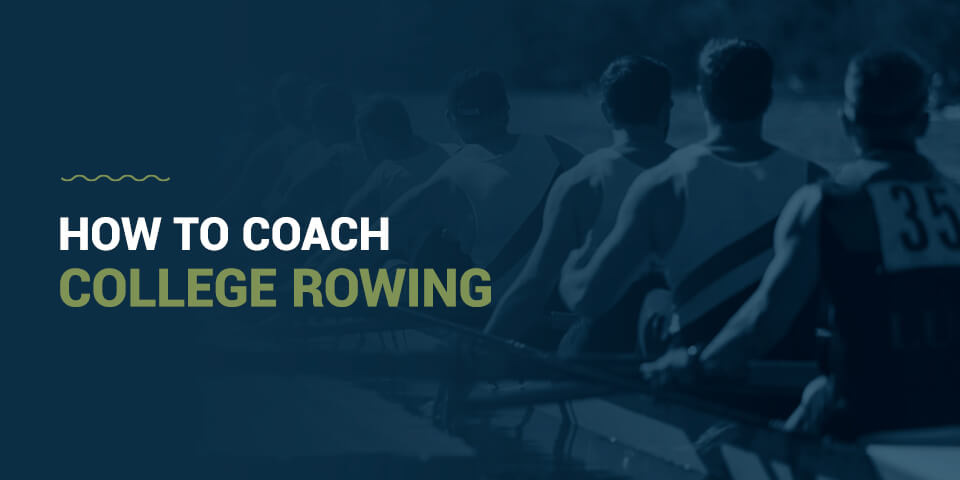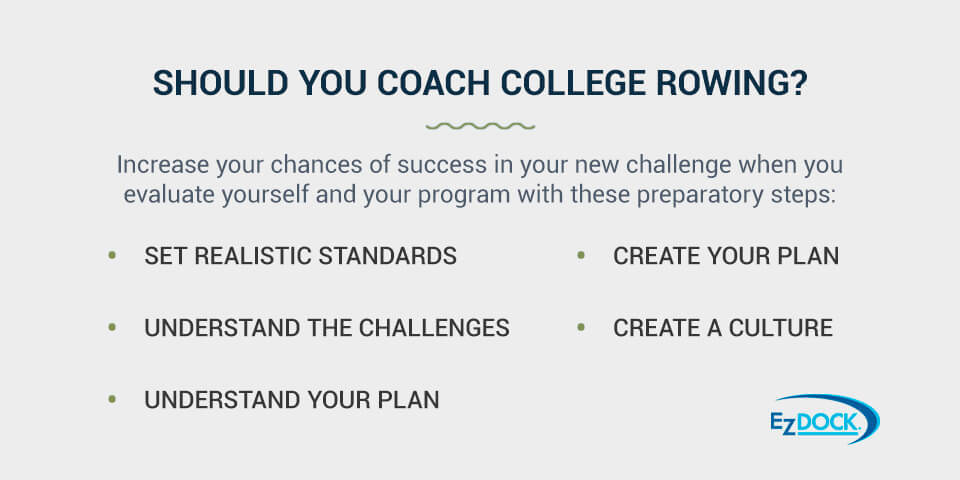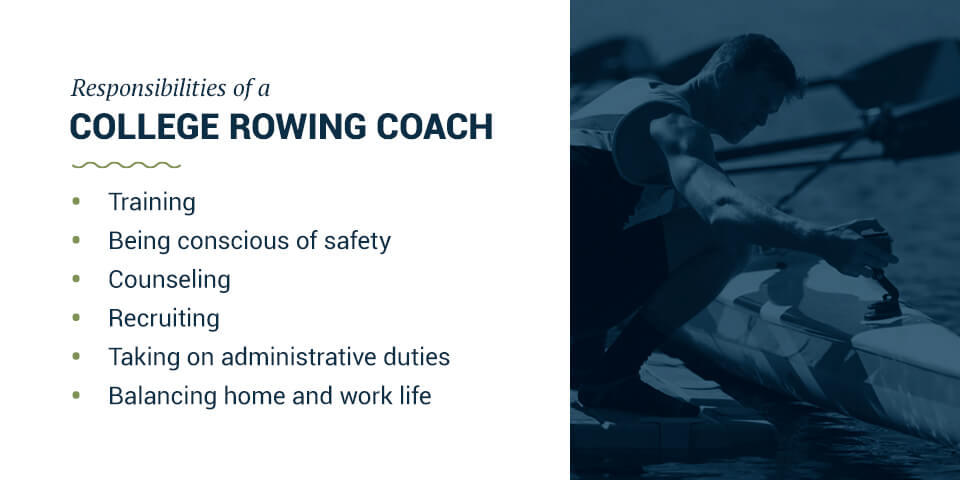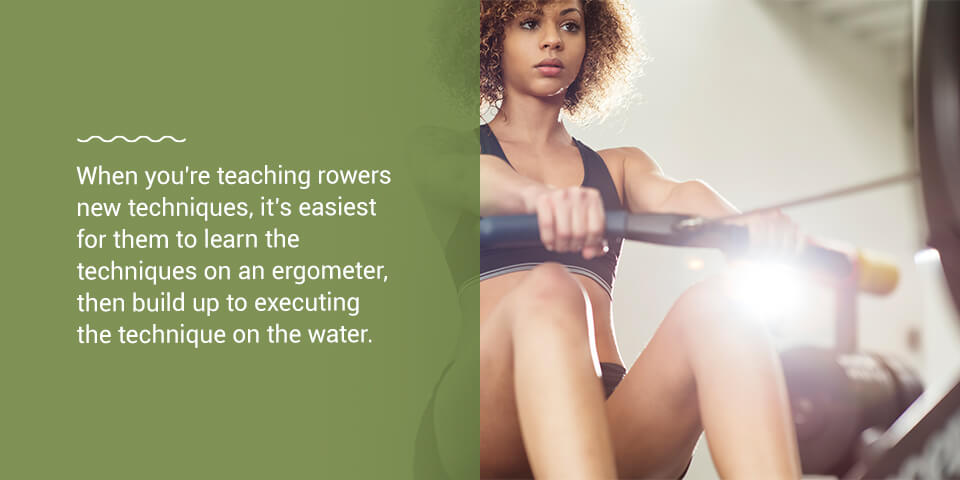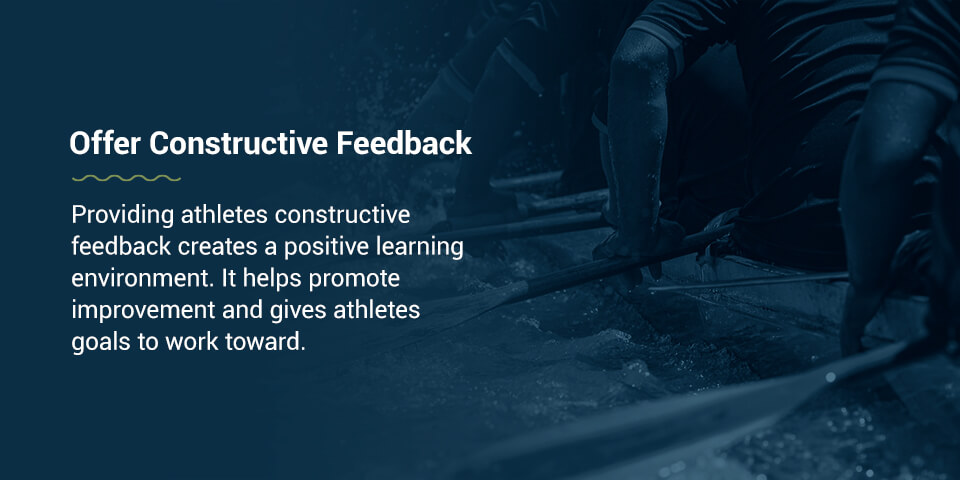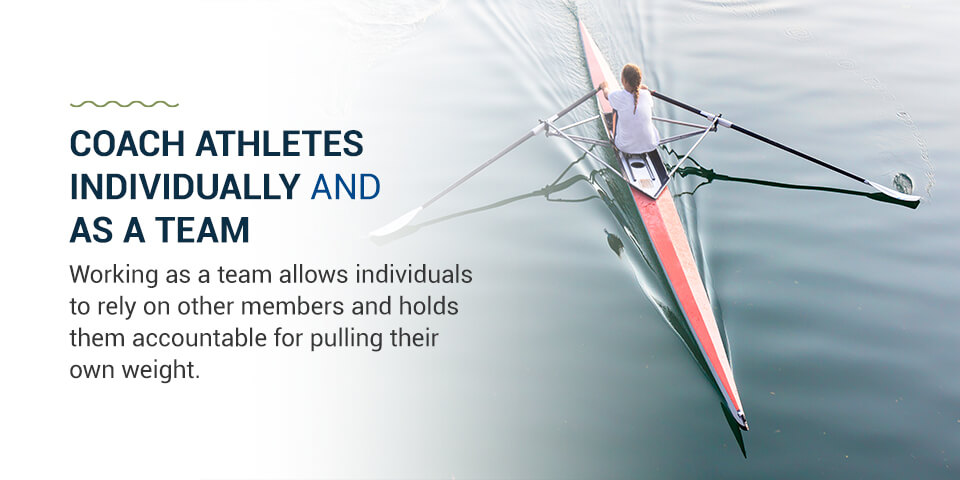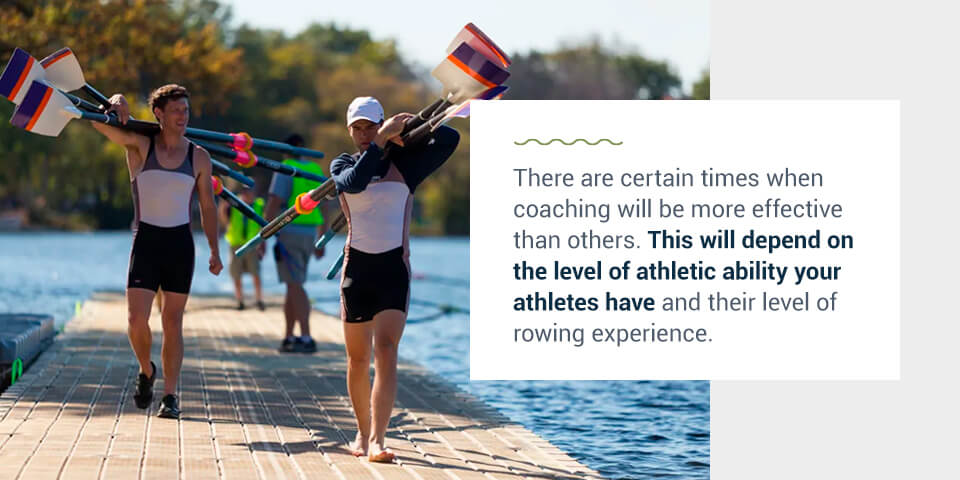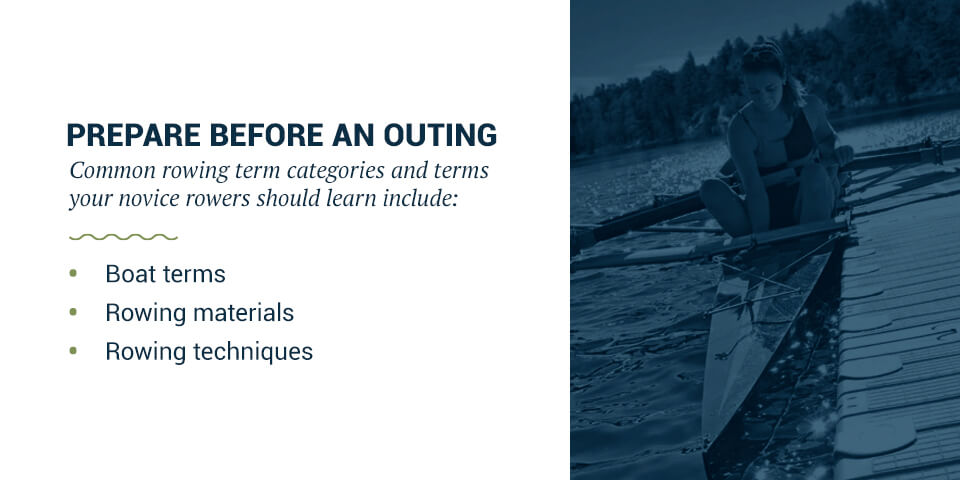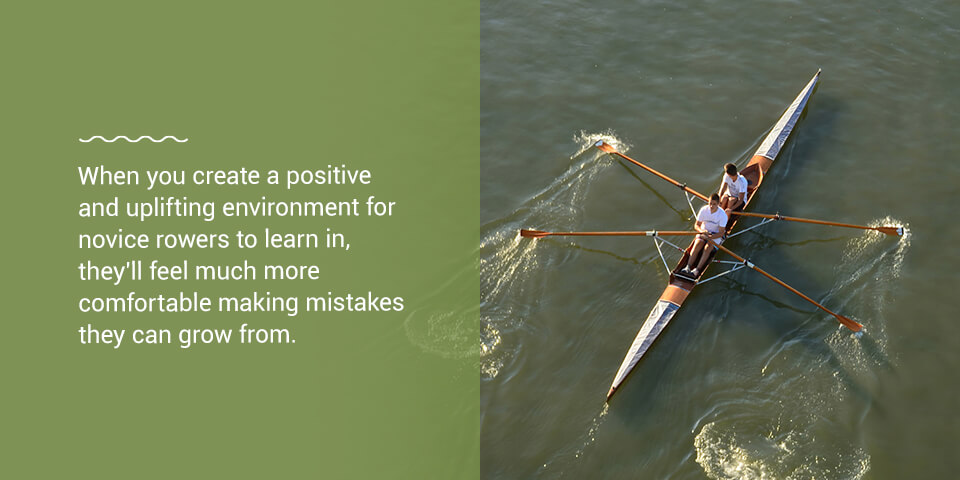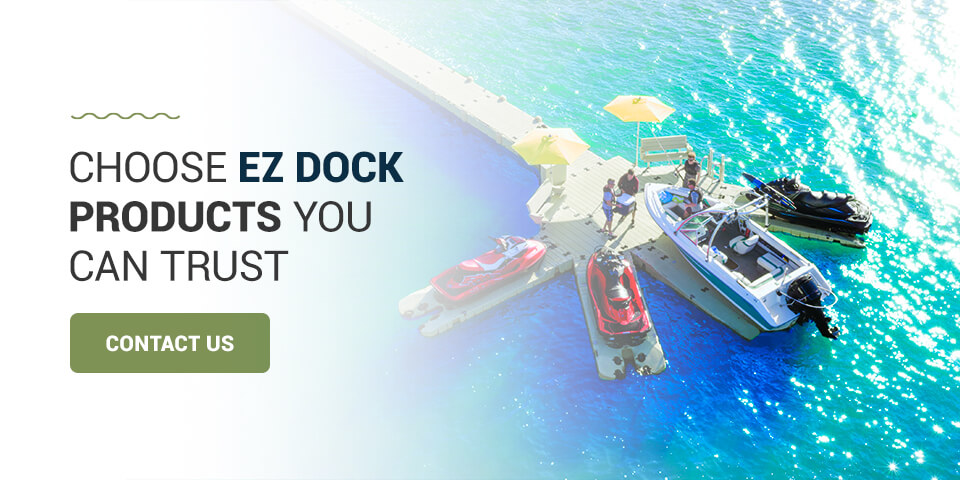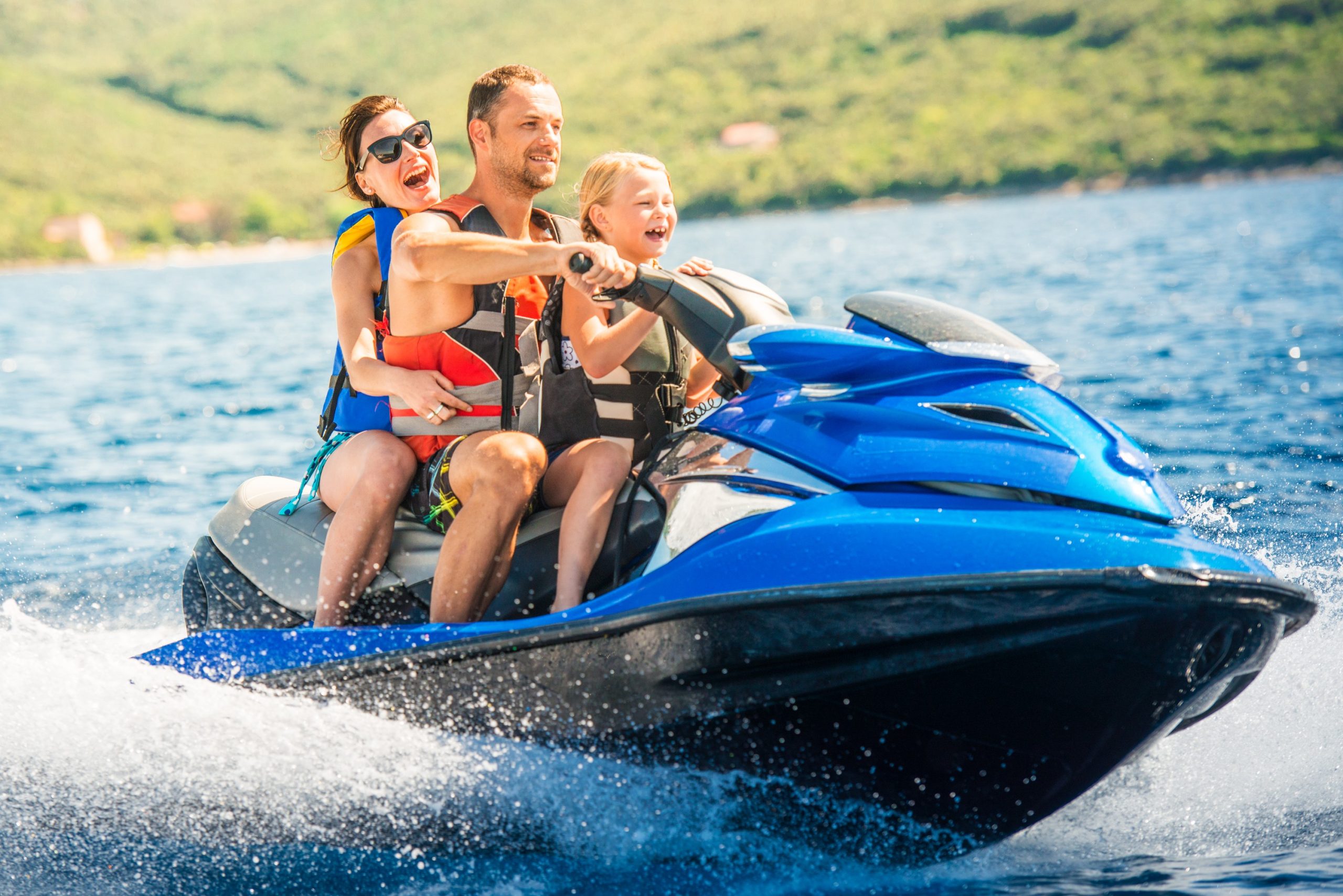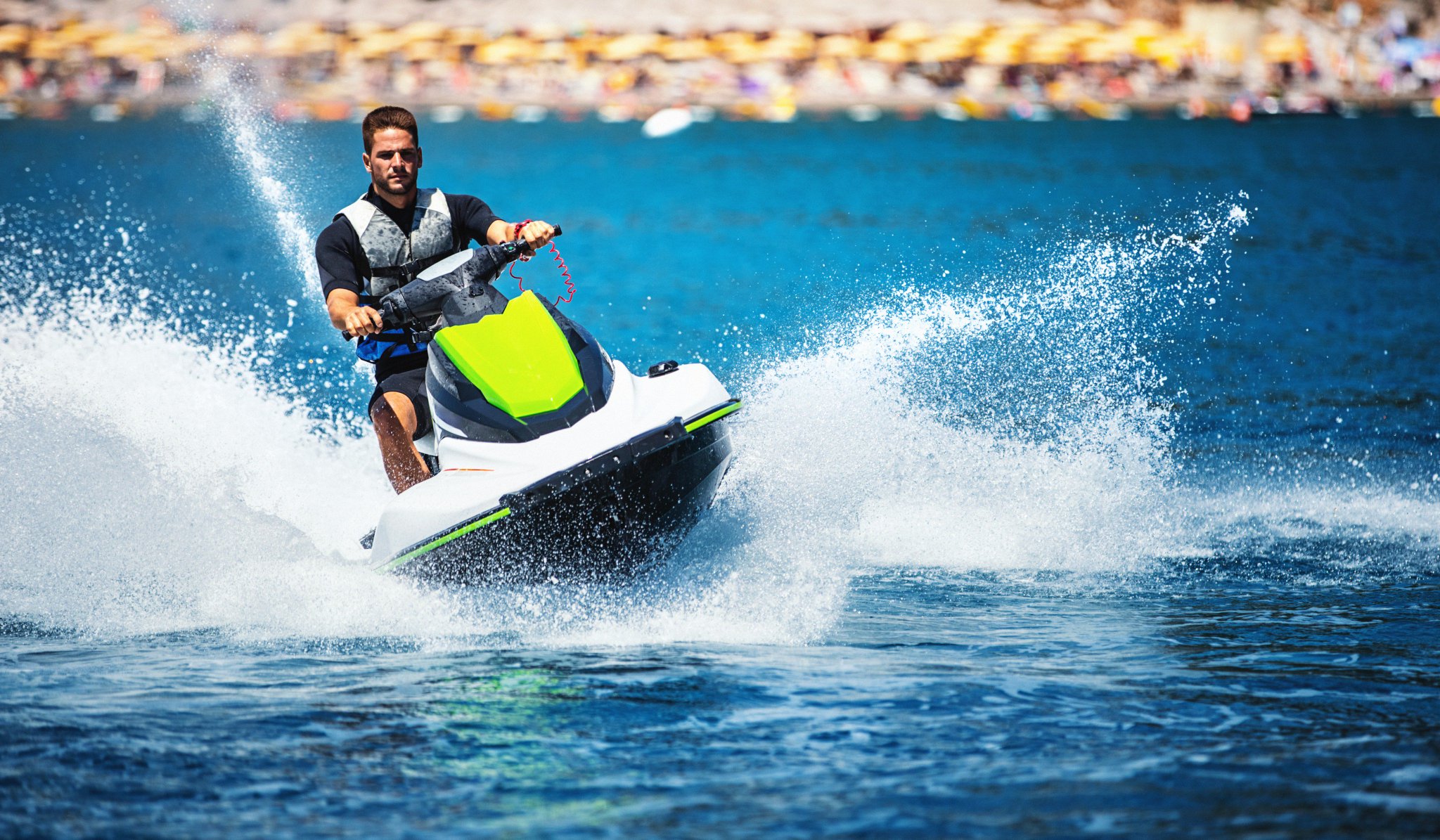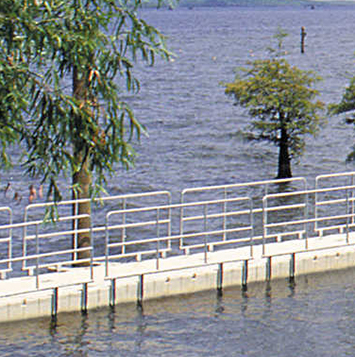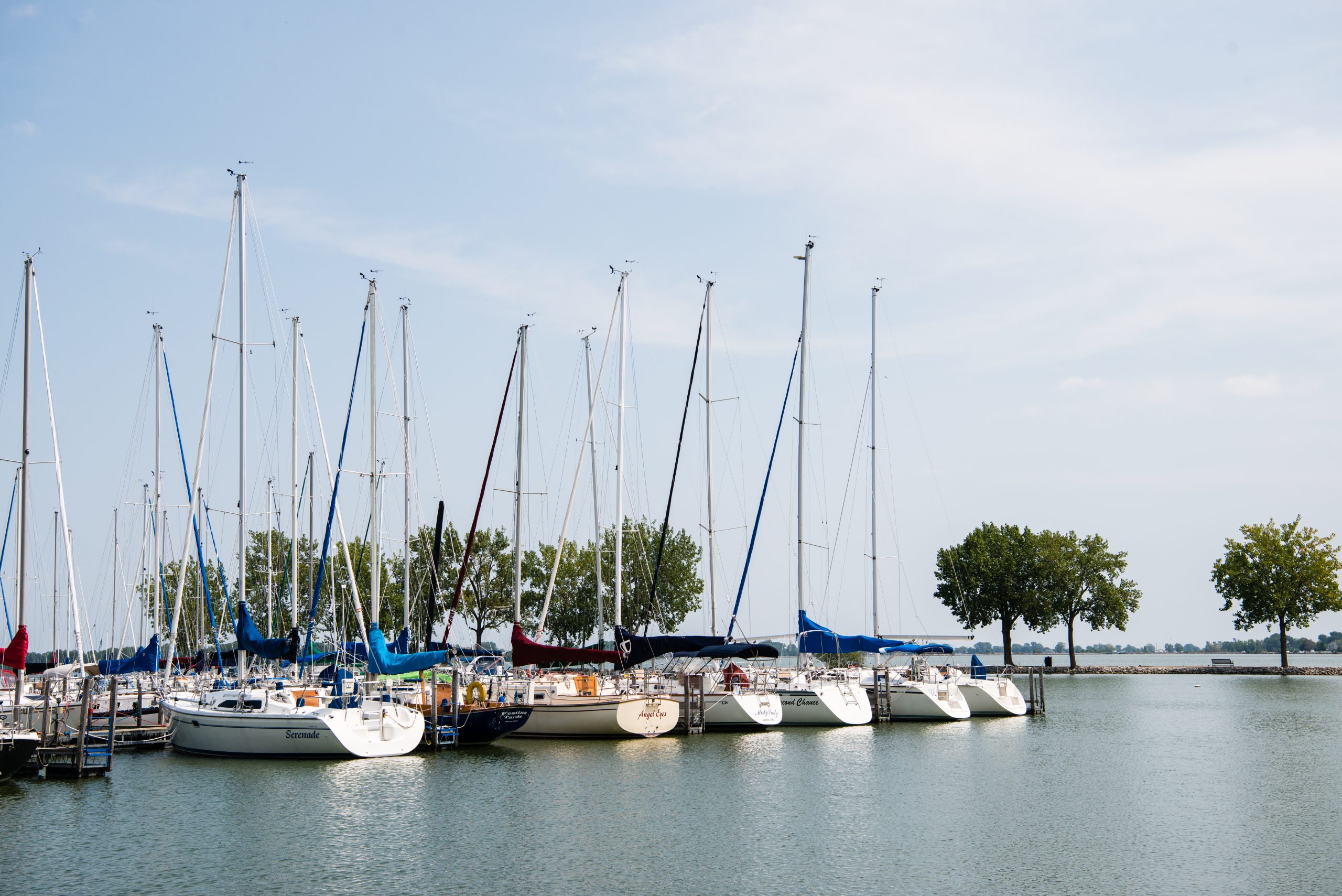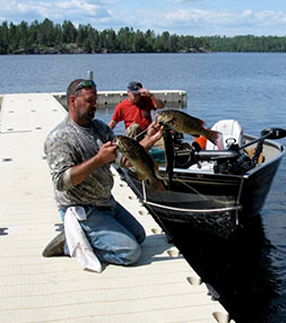Filters
How To Coach College Rowing
Coaching is much more than showing up to practice and running a few drills. As a rowing coach, you take on many responsibilities. If you’ve coached rowing before, you may have to work hard to find the same success you had at a previous program, and new rowing coaches may feel overwhelmed with where to start. Understanding the context of your rowing program and how to create a training plan that works with the program and athletes are among the first steps.
Coaching collegiate rowing is a big undertaking. We’ve created this guide to help you start your coaching career and find success with your new rowing program. If you approach the opportunity ready to share your knowledge and create an impactful experience for novice rowers, you’re already on the right track.
Read the full article or skip to a specific section:
- Should You Coach College Rowing
- Responsibilities of a College Rowing Coach
- How Does College Rowing Differ from Other Levels?
- How to Successfully Coach Collegiate Rowing
- Tips for Coaching Novice Rowers
Should You Coach College Rowing?
Deciding to coach rowing at the college level is a big commitment. Starting your coaching career takes preparation and dedication, and success will depend on a number of things. It’s important to understand your expectations, the challenges of the program and what your coaching plan looks like before you get too far into your season. Increase your chances of success in your new challenge when you evaluate yourself and your program with these preparatory steps:
1. Set Realistic Standards
First, you need to understand the level you’re coaching at so you can set realistic standards for your athletes, coaches and program as a whole. Understanding how your standards relate to success at the level you’re coaching helps you position your program for continual progress. It’s just as important to help your athletes understand the level they’re competing at and the standard you hold them to. This helps them set and achieve goals for the season.
2. Understand the Challenges
Next, evaluate the program to identify and understand the challenges it faces. Challenges can range from institutional pressure, funding and league difficulty to weather conditions, academic standards and proximity to the boathouse. Every program faces obstacles, and it’s up to you as the coach to adapt and overcome the obstacles to find success. For example, if your athletes consistently get caught in traffic on their way to practices, you may consider holding practice at a different time to avoid traffic.
3. Understand Your Plan
Coaches often take inspiration from other successful teams, past coaches or mentors when creating their plan. Techniques and training plans borrowed from these sources can be useful if you understand the context in which they were used. This understanding ties into understanding the level you’re coaching at. For example, the training regimen you followed as a novice in high school probably won’t work at a top collegiate rowing program, and vice versa. Understand how an inspiration plan will fit into your current situation.
4. Create Your Plan
Once you understand where the inspiration for your plan came from and how it can be used in your program, you’ll be on your way to creating a plan for your program. This will include trainings, workouts, practices and techniques. Understand why you want your athletes to row a certain way and how you plan to get them there. If you can’t explain this to yourself, your team may have a difficult time understanding, too.
5. Create a Culture
Intentionally create a positive culture for your program. The success of the program will increase when athletes have a positive environment in which they motivate themselves and each other and value the input of the coaching staff. Although a strong team culture won’t make problems disappear completely, it can make them less prevalent and less damaging.
Responsibilities of a College Rowing Coach
When you become a collegiate coach, you take on responsibilities like:
- Training: Coaches are responsible for training athletes. Implement training programs that include a combination of strength and conditioning, aerobic training and technical drills on the water and land. Another part of training is knowing the physical and mental state of the athletes going into a training session. This allows you to help each athlete develop to their individual potential, which will add to the team’s potential as a whole.
- Being conscious of safety: As a coach, you’re responsible for the safety and well-being of athletes. Be aware of the risks involved in a water sport. It’s likely you’ll be a first responder in an emergency since most of your practices and competitions will take place outside the campus athletic facility. In addition to monitoring athletes, you’ll need to recognize when the water conditions are dangerous and implement a backup plan for the safety of your team and equipment.
- Counseling: Athletes look to coaches for advice on topics ranging from training, hopes and fears, to social issues and relationship problems. Your consistent interaction with students and athletes makes you a trusted confidant. As a coach, you should be prepared to drop everything to help an athlete when they need it, even when it doesn’t concern rowing.
- Recruiting: Collegiate coaching involves recruiting athletes to enroll in the school and join your program. Recruiting involves looking for and meeting with student-athletes from all over the nation, and even internationally, to find the best talent to add to your team. Recruitment can be time-consuming and may require a coach to spend odd hours communicating with prospects from other time zones. Dedication to this process can have a big payoff.
- Taking on administrative duties: Coaches are often responsible for budgeting, fundraising and other administrative duties like completing paperwork and tracking athletes’ grades to determine NCAA eligibility. Coaches may also attend events like awards ceremonies or alumni celebrations. Although administrative work isn’t always fun and may take time away from training, it’s necessary for the success of the program.
- Balancing home and work life: Like any other occupation, coaches have to balance their personal life and work life. Rowing coaches often need to be willing to give up free time to help with equipment repair and maintenance, drive the trailer to competitions or possibly work a second job. Not all coaching positions come with a full-time salary, and some coaches work multiple jobs to provide for themselves and their families.
Despite any challenges that may arise from juggling coaching responsibilities, the experience can be rewarding if you stick with it and do the work to improve the athletes and the program.
How Does College Rowing Differ From Other Levels?
Collegiate rowing is arguably one of the most difficult teams for athletes to make. Rowing is a much less common high school sport, so college programs rely heavily on novice walk-ons. It’s common for the majority of collegiate rowing team members to be competitively rowing for the first time in their lives. Collegiate rowing does much less formal recruiting than other sports may, which is why everyone has the opportunity to try out for a collegiate team.
Another aspect to note about collegiate rowing is that men’s rowing is not an NCAA-sanctioned sport. Instead, men’s rowing teams are part of the Intercollegiate Rowing Association (IRA). There are currently 52 member institutions that compete across men’s and women’s lightweight and men’s heavyweight categories. Although teams that are part of the IRA pay dues to be members, they still follow many similar rules and guidelines to NCAA-sanctioned sports. Athletes’ grades are still tracked and are a factor in determining eligibility.
Most women’s rowing teams are NCAA-sanctioned. Lightweight and heavyweight teams compete across three divisions. Hundreds of women attend informational sessions and tryouts, and only a handful achieve seats on the roster. Because of the sheer number of potential rowers and the strength and dedication to training it takes to be successful, many candidates decide on their own that they are not suited for rowing.
How to Successfully Coach Collegiate Rowing
When you’re ready to jump into the day-to-day flow of coaching, consider these steps to be an efficient and effective coach:
1. Demonstrate Techniques
When you’re teaching rowers new techniques, it’s easiest for them to learn the techniques on an ergometer, then build up to executing the technique on the water. Demonstrate the technique first, then break it down into steps so it’s manageable for new rowers. Have athletes start with just their arms, then gradually put it all together.
Note that everyone has different learning styles. Monitor how your team members take in information and consider offering diagrams or videos to complement your demonstrations.
2. Build a Consistent Training Program
Creating a consistent training schedule allows athletes to build a routine within the sport and around trainings and competitions. Balancing school and athletics can be overwhelming at times, so giving your team some consistency goes a long way. For example, you may decide two days out of the week are dedicated to land training and the other three are to be spent on the water, weather permitting. Or maybe you try to keep all practices and workouts at the same time every session.
Use whatever works most effectively for you, your coaches and the athletes. Make sure you use a combination of land and water training in your program. Water training is important to prepare for competitions. Land training is useful for building strength, working on fitness and improving technique.
3. Offer Constructive Feedback
The best learning environments are those that offer constructive feedback and encouragement. An effective way to do this is sandwiching constructive feedback between two compliments. For example, give the athlete praise for something they’re doing well, then offer a way to help them improve on a certain aspect. At the end, mention that what they’re working on is coming along well.
Providing athletes constructive feedback creates a positive learning environment. It helps promote improvement and gives athletes goals to work toward. Continuously help your team set goals to push them towards improvement. The key here is to provide athletes the tools necessary to be successful and achieve the goals they set individually and as a team.
4. Brief Before Sessions and Debrief Afterward
Brief your athletes before a training session or workout so they know what to expect from the session. Use this as an opportunity to recap previous sessions and highlight what you want to work on and why. After your session or outing, debrief the team. Highlight what was done well and discuss points to think about and work on for next time.
This is also something you can do with your athletes before and after a competition. A quick briefing beforehand can help get them focused and in the right mindset, and a debriefing afterward can be used to celebrate successes and prepare for potential improvement.
5. Coach Athletes Individually and as a Team
Of course, your athletes should be coached collectively as a team. This ensures they know how to work with each other and can help motivate and encourage each other. Working as a team allows individuals to rely on other members and holds them accountable for pulling their own weight.
As a coach, it’s important you acknowledge the value of coaching each athlete individually. When they practice together as a team, individuals may be able to hide their weaknesses among the strengths of others. This is detrimental to both the individual and the team as a whole. When individual athletes are performing below their full potential, the team as a whole will fall below its full potential. Even the best teams can become better through individual improvement.
6. Know When to Coach
There are certain times when coaching will be more effective than others. This will depend on the level of athletic ability your athletes have and their level of rowing experience.
Generally, it is more difficult for less-experienced rowers to listen to your coaching and make changes while they’re rowing. Keep this in mind when working with novice rowers. Coaching may be more effective when they’re stopped so they can focus on what you’re saying. Communicate with them and have them try your suggestions while you reinforce the suggestions through calls while they’re rowing. Doing so can also help them practice listening for your calls while rowing.
More experienced rowers will have greater ease listening to your coaching and making changes while rowing because they’re more comfortable with techniques and jargon. Complex changes may still be difficult, so try to keep calls concise while athletes are actively rowing. Regardless of their level of experience, it’s always good practice to reinforce the changes you suggested while the rowers are idle. This helps ensure athletes heard your calls correctly and know how to make the changes requested.
Tips for Coaching Novice Rowers
Novice rowers may show up to the first session feeling nervous and unsure of what to expect. If it’s your first time coaching novice rowers, you may feel much of what they’re feeling as well! Start with the basics and build a relationship with your new rowers. Your team will become more successful when they feel comfortable coming to you for help and learning from you.
1. Prepare Before an Outing
The majority of walk-on team members will be novice rowers, meaning this is their first time rowing. Everything will be new and unknown to them, so beginning with terminology helps set a basis for understanding techniques moving forward. Common rowing term categories and terms your novice rowers should learn include:
- Boat terms: It’s essential for novice athletes to gain an understanding of the parts of a boat early in their training so they’re comfortable working with the boat and being in the boat on the water. Important terms include bow, stern, deck, port, shell, starboard, slide, stretcher, bow ball and backstops.
- Rowing materials: In addition to knowing boat parts, novice rowers need to learn what the materials they use are called and what they’re for. These terms include oar, spoon, button, rigger, gate, ergometer, German rigging and rowing performance monitors. These materials and tools are essential to know because they allow you to teach and allow rowers to learn techniques.
- Rowing techniques: Knowing the roles of people on the boat and learning the techniques used allows rowers to become successful. Novice rowers should learn about the coxswain, bow coxed boat, stroke, catch, length, extraction, recovery, finish, straight, run, lightweight, power 10, skull, skulling and swing. As rowers develop these techniques, they’ll be able to improve their skills and rowing times.
Although it takes time for novice rowers to memorize all the terms and learn the techniques, it’s a good introduction to the sport. Before going on their first outing, novice rowers should also get a tour of the boathouse and learn how to get boats off racks, how to carry the boats and blades, how to adjust the foot stretcher and how to get in and out of the boat.
2. Educate Rowers About Your Program
Teach your new rowers about your program’s rules of the water. These rules will likely vary depending on your program and school’s location. For example, some teams require the coxswain to wear a lifejacket. Other examples might include times rowers are allowed on the water and on-the-water etiquette. Also, communicate when and where practices or training will take place and be transparent about the demands of the sport.
3. Offer Encouragement and Positivity
Encouragement goes a long way with any athlete, especially athletes trying a sport for the first time. When you create a positive and uplifting environment for novice rowers to learn in, they’ll feel much more comfortable making mistakes they can grow from. Positive team culture makes the sport more enjoyable and drives athletes to continue learning and improving to benefit themselves, the team and the program as a whole.
Choose Products You Can Trust
Coaching college rowing requires time and dedication to teach athletes skills and techniques and help them improve individually to make the team more effective as a whole. As a coach, you want to make sure your athletes and program have the best equipment for training and competing, from boats to oars to docks. You need to be able to trust the products you invest in, which is why you should choose EZ Dock for all your docking needs.
EZ Dock creates low-maintenance docks that can benefit your rowing program. We understand the number of responsibilities you have on your plate as a coach. Dock maintenance and repairs shouldn’t be one of them. Replace your docks with products from EZ Dock so you have time to focus on the bigger responsibilities of coaching.
Whether you’re looking for a reliable practice dock or want to add a floating dock to your waterway, discover the best docks for rowing teams. EZ Dock has a wide selection of docks you can use within your rowing program. For more information and to learn what EZ Dock can do for you, fill out our contact form and a team member will reach out!

